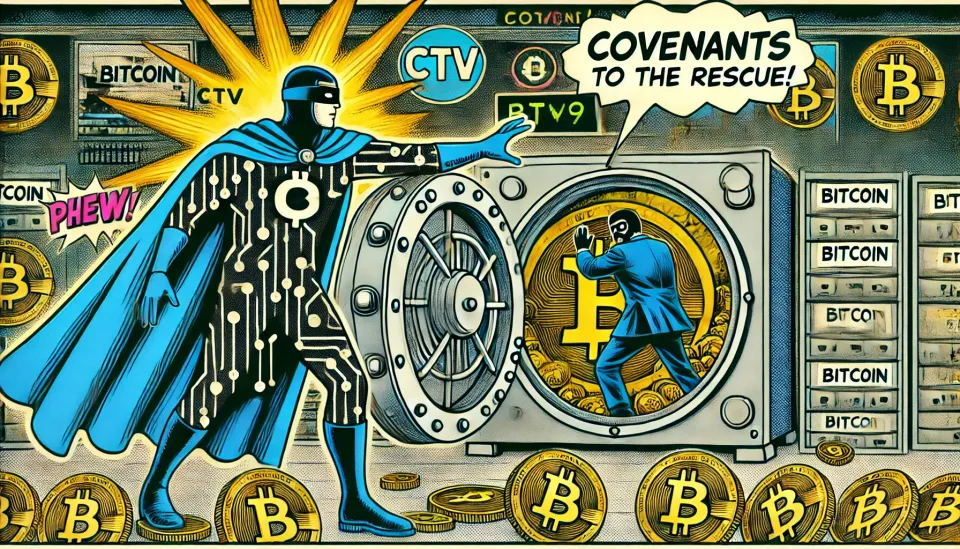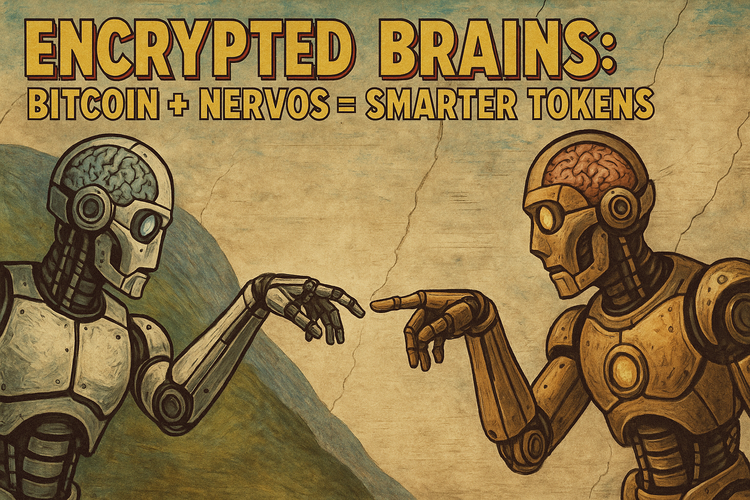Bitcoin Covenants: The Tiny Handcuffs That Could Save Your Coins

1. BITCOIN’S NEXT BIG LEAP: RULES FOR YOUR FUTURE SELF
Okay, so imagine this:
You send your Bitcoin into the future, but you leave it a note — “Dear future self, you can only spend this money if you do it this way, and don’t mess it up.”
Sounds weird? Welcome to Bitcoin Covenants.
They’re like tiny programmable handcuffs for your BTC. Not to restrict you (well, kind of), but to protect your coins from thieves, mistakes, and your own future dumb decisions.
2. WTF IS A COVENANT?
Covenants are rules you attach to your coins.
In technical speak: they’re proposed changes to Bitcoin’s scripting language that let you control how and where your Bitcoin can be spent — not just by whom.
It’s like giving your money a GPS and a curfew.
The tech that might make this happen?
OP_CHECKTEMPLATEVERIFY (CTV) — which sounds like a rejected Marvel villain, but it’s actually a clever opcode that locks down future transaction templates.
3. WHY WOULD YOU EVER WANT THIS?
So glad you asked.
Here’s what these handcuffs are good for:
→ Vaults
Think of it as a digital safe that screams:
“Sure, you can take the money — but only if you wait 3 days and send it to this backup wallet.”
🛡 Great for stopping hacks.
😅 Even better for stopping your own panic button.
→ Congestion Coupons
Bitcoin network fees going brrr?
Covenants let you pre-plan a bunch of transactions and execute them later, when fees are low.
Batch it, stack it, and chill.
→ Smart Contracts, Lite Edition
They’re not Ethereum-level crazy.
But covenants give Bitcoin a bit more of a brain — allowing escrow-like setups, programmable payments, or splitting funds based on predefined rules.
→ Privacy Trees (yes, this is real)
You can commit to a whole tree of possible spends.
Only one branch shows up publicly. The rest? 🌳 Hidden.
4. THE DARK SIDE: YES, THERE IS ONE
As always, with great power comes... weird crypto Twitter debates.
Critics say:
- “It’s a privacy risk” – 'cause someone could trace the spending path.
- “It’s a censorship vector” – What if exchanges or governments enforce spending rules?
- “It’s adding complexity” – And Bitcoiners hate that more than pineapple on pizza.
5. WHAT THE DEVS ARE SAYING
Bitcoin devs are split. Some love it.
Some are like: “Nah bro, not until we test it 10,000 more times and argue on Reddit for 3 more years.”
But proposals like CTV and Simplicity are gaining traction.
Even Jeremy Rubin (the guy who wrote CTV) is out there pushing for it.
6. SO… SHOULD YOU CARE?
Yes. Even if you don’t touch code.
Because if this gets adopted, you might one day:
- Have vaults protecting your life savings
- Pay lower fees by batching future transactions
- Or just sleep better knowing your Bitcoin isn’t going to be yeeted into a hacker’s wallet overnight
It’s like giving your money a rulebook and a seatbelt.
TL;DR – YOUR CHEAT SHEET
Bitcoin Covenants = spending rules for the future
They could make Bitcoin safer, smarter, and cheaper.
But they also open doors to more control — for better or worse.
Whether it flies or flops depends on how the community reacts (and whether devs can stop arguing long enough to implement it).
Until then: Watch this space. Because Bitcoin might finally be getting some adult supervision.
💡 Subscribe to Notoko Bytes for more crypto chaos straight to your inbox! 🚀

Want to feature your brand on Notoko Bytes? 🚀 Contact us at ctrascend@gmail.com for sponsored posts!
Disclaimer
*The information and analysis provided in this article are intended for educational and informational purposes only and should not be considered as financial, investment, or professional advice. While our team strives to ensure the accuracy and reliability of the content, we make no representations or warranties of any kind, express or implied, about the completeness, accuracy, reliability, suitability, or availability of the information presented.
The content within this article may include opinions and forward-looking statements that involve risks and uncertainties. The blockchain and cryptocurrency markets are highly volatile, and past performance is not indicative of future results. Any reliance you place on the information presented is strictly at your own risk. Before making any investment decisions, we highly recommend consulting with a qualified financial advisor or conducting your own thorough research.
By accessing and using the information provided in this article, you acknowledge and agree that neither the authors, publishers, nor any other party involved in the creation or delivery of the content shall be held liable for any direct, indirect, incidental, consequential, or punitive damages, including but not limited to loss of profits, goodwill, or data, arising out of your use or inability to use the information provided or any actions you take based on the information contained within this section.*





